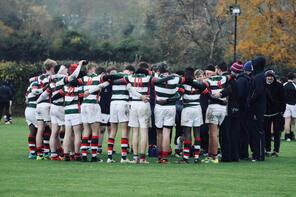
It’s a good question. Unfortunately, even those of us who have played both roles don’t ask it often enough.
So it was refreshing to read the musings of Brian O’Driscoll, the soon-to-retire star of Ireland rugby, in his 2005 book, A Year In The Centre. O’Driscoll played his last international match this past weekend, leading the Irish side to its second-ever Six Nations championship. The photo he tweeted of his soiled jersey and cleats, removed for the last time, must have left many an Irish eye tearful.
When O’Driscoll wrote his bestseller—essentially a journal of his playing year, which included his tragically brief captaincy of the British & Irish Lions—he was shy of his barely a quarter-century old. While he’d already enjoyed a stunning career, some of his greatest experiences still lay ahead.
Yet, despite his youth, O’Driscoll held a mature view of the rugby news media. Though wary in their presence—they could be vicious when aroused—he appreciated good, thoughtful reporters.
“Some of the journos are interesting guys with different takes on things,” he noted. “Close contact with excellence, in any form, is always inspiring.”
As a result, O’Driscoll made every effort to give them something useful. “You try to treat every new interview as seriously as the previous one,” he said.
Still, O’Driscoll had an uneven experience with the press. He disliked being media trained—“I pride myself on being able to think on my feet and formulate my own views and have worked hard over the last couple of years to be informative and honest”—yet he sometimes naively put his foot in it. In one instance, he referenced the cyclical nature of rugby dynasties and was accused of making a dig against England.
O’Driscoll was infuriated when British and Irish reporters reported false rumors about his Lions teammates with no effort to check the facts. And he fumed at the slanted coverage of his injury against New Zealand, when two All-Blacks players pile-drove him into the turf and dislocated his shoulder; only one NZ paper dared criticize the home team.
As on the rugby pitch, O’Driscoll gave his best and expected others to do so, too. He gave respect and expected it in return. Anything less diminished the efforts of all.
Therein lies a good rule of thumb, regardless of which side of the microphone one stands.
Any infractions were forgiven as O’Driscoll gave his last interviews on Saturday, still clad in the soiled Ireland jersey he’d later enshrine on Twitter, still willing to give a reporter something useful.
“I know now why I’m packing it in,” he observed, a twinkle in his eye, “because 80 minutes is a long bloody time at international level, particularly with guys like (six-foot, 271-pound French center) Mathieu Bastareaud running at you. It’s no fun.”

 RSS Feed
RSS Feed
